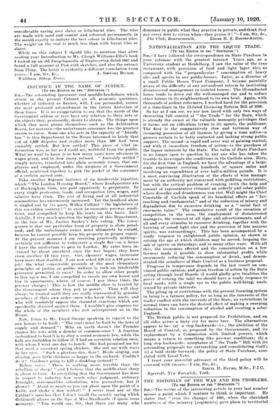whether of industry or finance, will, I am persuaded, arouse
the most profound astonishment in the future historian of these times. It is no exaggeration to say that the words of the Government seldom or ever bear any relation to their acts or the objects they, professedly, desire to obtain. The things upon which they most plume themselves—such as the Arbitration Board, for instance—the unfortunate consumer has the greatest reason to curse. Some one who acts in the capacity of "broody hen " to this Department in the House informed us lately that
out of 1,000 disputes and strikes more than 800 had been amicably settled. But how settled? This piece of vital in- formation was, as far as I could see, withheld from the public. What we want to know is in how many cases were advances in wages given, and in how many refused. " Amicably settled" simply means, translated into plain economic terms, that em- ployers and employed, under the auspices of a Government official, combined together to pick the pocket of the consumer of a. certain agreed sum.
Take another flagrant instance of an intolerable injustice, which " The London Housing Board," whose headquarters are at Buckingham Gate, are paid apparently to perpetuate. In every single profession, trade, and occupation fees, wages, and salaries have risen. The cost of living and of all industrial commodities has enormously increased. Yet the landlord alone is singled out by (to quote Wilkie Collins) " the legislators of this ass-ridden country!" to exist in economic pre-war condi- tions, and compelled to keep his rents on this basis. Inci- dentally, I very much question the legality of this Department, in the face of Mr. Justice Sankey's late ruling. The conse- quence is that one particular form of property is alone penal- ' ized; and the unfortunate owner must ultimately be ruined, because he cannot possibly keep his property in proper repair. At the present moment I am receiving practically nothing— certainly not sufficient to redecorate a single fiat—on a house
have the misfortune to own in London. My rates have in- ?reased by about one-third since the war began; they have risen another 24 this year. Gas, cleaners' wages, insurance have more than doubled. I am now asked £10 for a £10 pre-war. job! On what conceivable grounds of the most elementary principles of justice or public welfare is such an intolerable -grievance permitted to exist? In order to allow other people to live upon me, I am compelled to vacate my own house and live in apartments, where, of course, I pay three times the pre-war 'charges ! This is how the middle class is treated by the Government whom they put in power. Thus will they always be treated until they are really represented by genuine numbers of their own order—men who know their needs, and who will resolutely oppose the shameful exactions which are specifically directed against them. I wouldn't give sixpence for the whole of the members who now misrepresent us in the House.
Now, listen to Mr. Lloyd George speaking in regard to the new houses to be built : "The rents must be fixed by the laws of supply and demand "! Why on earth doesn't the Premier cleanse his wits with a douche of common-sense ? A fraction (subsidized to hoot!) is to obey a sound economic law, while the bulk are forbidden to follow it. I had an eccentric relation once, with whom I went one day to lunch. She had promised me for that meal a succulent spring chicken. She met me with tears in her eyes. " Such a glorious day, dear ! Birds singing, sun shining, poor little chickens so happy ill the orchard. Couldn't Jo it! Gardener going to kill a dookling instead ! "
Balzac says : " There is nothing more terrible than the rehellion of sheep ! " and I believe that the •middle-class sheep is about to turn. In everything that the Government has done in respect to industry how much sober judgment, ordinary foresight, statesmanlike calculation, wise precaution, has it shown?. "About as much as you can place upon the point of a knife, and choke a dew withal! " I never read any of the Cabinet's speeches that I don't recall the caustic saying which Goldsmith places on the lips of Miss Hardeastle (I quote from memory): " You would say, Sir, that- there are many who
denounce in public what they practise in private, and think they pay every debt to virtue when—they praise it ! "—I am, Sir, Arc.,


































 Previous page
Previous page